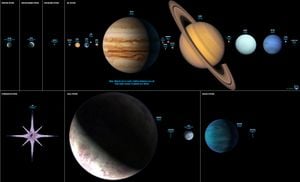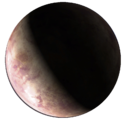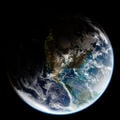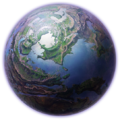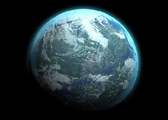Planet: Difference between revisions
From Halopedia, the Halo wiki
m (Text replacement - "{{Ref/Sources}} [[" to "{{Ref/Sources}} [[") |
No edit summary |
||
| Line 1: | Line 1: | ||
{{Status|Canon}} | |||
{{Wikipedia}} | {{Wikipedia}} | ||
{{stub}} | {{stub}} | ||
[[File:HaloPlanets.jpg|thumb|right|300px|Planets, moons and other celestial objects in comparison to one another.]] | [[File:HaloPlanets.jpg|thumb|right|300px|Planets, moons and other celestial objects in comparison to one another.]] | ||
'''Planets''' are celestial objects in the [[Milky Way]] galaxy. They are found in systems orbiting stars. Planets themselves are sometimes orbited by both [[natural satellite]]s and artificial [[space station]]s. [[City|Cities]] are also often built on planetary surfaces. | '''Planets''' are celestial objects in the [[Milky Way]] galaxy. They are found in systems orbiting stars. Planets themselves are sometimes orbited by both [[natural satellite]]s and artificial [[space station]]s. [[City|Cities]] are also often built on planetary surfaces. | ||
| Line 8: | Line 10: | ||
{{Main|Terraforming}} | {{Main|Terraforming}} | ||
Terraforming is a series of processes to make planets suitable for habitation.{{Ref/Novel|Novel=Halo: Ghosts of Onyx}} It can take several centuries to fully terraform an Earth-sized planet, depending on what is needed.<ref>''[[Halo: Reach]]'', [[Data pads|Data pad 14]]</ref> Humans first began terraforming around the 22nd-century in the Sol system.<ref>''[[Halo Encyclopedia (2009 edition)]]'', p. 42 (2011)</ref> The [[Covenant]] can terraform worlds solely to produce [[plasma]].<ref>''[[Halo: Escalation]]'', Issues 1-2</ref> The [[Flood]] could also terraform, by altering the atmosphere of worlds they touched.{{Ref/Level|Game=Halo: Combat Evolved|Level=The Library|Quote=Your environment suit will serve you well when the Flood begin to alter the atmosphere - you are a good planner!}} | Terraforming is a series of processes to make planets suitable for habitation.{{Ref/Novel|Novel=Halo: Ghosts of Onyx}} It can take several centuries to fully terraform an Earth-sized planet, depending on what is needed.<ref>''[[Halo: Reach]]'', [[Data pads|Data pad 14]]</ref> Humans first began terraforming around the 22nd-century in the Sol system.<ref>''[[Halo Encyclopedia (2009 edition)]]'', p. 42 (2011)</ref> The [[Covenant]] can terraform worlds solely to produce [[plasma]].<ref>''[[Halo: Escalation]]'', Issues 1-2</ref> The [[Flood]] could also terraform, by altering the atmosphere of worlds they touched.{{Ref/Level|Game=Halo: Combat Evolved|Level=The Library|Quote=Your environment suit will serve you well when the Flood begin to alter the atmosphere - you are a good planner!}} | ||
===Slipspace affects=== | ===Slipspace affects=== | ||
{{Main|Slipstream space}} | {{Main|Slipstream space}} | ||
Planets can generate enough of a gravitational force that it can affect the superfine quantum filaments that are needed for slipspace drives; something UNSC calculations couldn't figure out. Covenant drives, which originate from Forerunner drives aren't affected by this.<ref>''[[Halo: First Strike]]'', p. 85</ref> | Planets can generate enough of a gravitational force that it can affect the superfine quantum filaments that are needed for slipspace drives; something UNSC calculations couldn't figure out. Covenant drives, which originate from Forerunner drives aren't affected by this.<ref>''[[Halo: First Strike]]'', p. 85</ref> | ||
==Types== | ==Types== | ||
*'''Gas giant''' - Planets predominately composed of gases.<ref name="solsystem">''[[Halo Encyclopedia (2009 edition)]]'', The Sol System, p. 282-283 (2009)</ref>{{Ref/Site|D=01|M=6|Y=2020|URL=https://www.halowaypoint.com/en-us/universe/locations/threshold|Site=Halo Waypoint|Page=Universe - Threshold}} While the UNSC/UEG does not possess the ability to mine these worlds,{{Ref/Reuse|solsystem}} the Forerunners did.{{Ref/Site|Id=threshold|D=01|M=6|Y=2020|URL=https://www.halowaypoint.com/en-us/universe/locations/threshold-gas-mine|Site=Halo Waypoint|Page=Universe - Threshold Gas Mine}} Some of these gas giants were the anchor sites for [[Halo Array|Halo ring]]s.{{Ref/Site|D=01|M=6|Y=2020|URL=https://www.halowaypoint.com/en-us/universe/locations/delta-halo|Site=Halo Waypoint|Page=Universe - Delta Halo}}{{Ref/Reuse|threshold}} | *'''Gas giant''' - Planets predominately composed of gases.<ref name="solsystem">''[[Halo Encyclopedia (2009 edition)]]'', The Sol System, p. 282-283 (2009)</ref>{{Ref/Site|D=01|M=6|Y=2020|URL=https://www.halowaypoint.com/en-us/universe/locations/threshold|Site=Halo Waypoint|Page=Universe - Threshold}} While the UNSC/UEG does not possess the ability to mine these worlds,{{Ref/Reuse|solsystem}} the Forerunners did.{{Ref/Site|Id=threshold|D=01|M=6|Y=2020|URL=https://www.halowaypoint.com/en-us/universe/locations/threshold-gas-mine|Site=Halo Waypoint|Page=Universe - Threshold Gas Mine}} Some of these gas giants were the anchor sites for [[Halo Array|Halo ring]]s.{{Ref/Site|D=01|M=6|Y=2020|URL=https://www.halowaypoint.com/en-us/universe/locations/delta-halo|Site=Halo Waypoint|Page=Universe - Delta Halo}}{{Ref/Reuse|threshold}} | ||
| Line 25: | Line 29: | ||
File:Waypoint - Janjur Qom.png|[[Janjur Qom]], cradle world of the [[San'Shyuum]]. | File:Waypoint - Janjur Qom.png|[[Janjur Qom]], cradle world of the [[San'Shyuum]]. | ||
</gallery> | </gallery> | ||
===By species=== | ===By species=== | ||
====Human==== | ====Human==== | ||
| Line 32: | Line 37: | ||
File:Harvest pre-glassing.png|[[Harvest]], an agriculture world. | File:Harvest pre-glassing.png|[[Harvest]], an agriculture world. | ||
</gallery> | </gallery> | ||
====Covenant==== | ====Covenant==== | ||
*'''[[Sangheili colonies]]''' - Colony planets settled by Sangheili. | *'''[[Sangheili colonies]]''' - Colony planets settled by Sangheili. | ||
Revision as of 14:26, March 23, 2022
| There is more information available on this subject at Planet on the English Wikipedia. |
 This article is a stub. You can help Halopedia by expanding it.
This article is a stub. You can help Halopedia by expanding it.
Planets are celestial objects in the Milky Way galaxy. They are found in systems orbiting stars. Planets themselves are sometimes orbited by both natural satellites and artificial space stations. Cities are also often built on planetary surfaces.
Overview
Terraforming
- Main article: Terraforming
Terraforming is a series of processes to make planets suitable for habitation.[1] It can take several centuries to fully terraform an Earth-sized planet, depending on what is needed.[2] Humans first began terraforming around the 22nd-century in the Sol system.[3] The Covenant can terraform worlds solely to produce plasma.[4] The Flood could also terraform, by altering the atmosphere of worlds they touched.[5]
Slipspace affects
- Main article: Slipstream space
Planets can generate enough of a gravitational force that it can affect the superfine quantum filaments that are needed for slipspace drives; something UNSC calculations couldn't figure out. Covenant drives, which originate from Forerunner drives aren't affected by this.[6]
Types
- Gas giant - Planets predominately composed of gases.[7][8] While the UNSC/UEG does not possess the ability to mine these worlds,[7] the Forerunners did.[9] Some of these gas giants were the anchor sites for Halo rings.[10][9]
Covenant forces over the gas giant Jupiter.
Delta Halo in orbit of the gas giant Substance
- Cradle world - Cradle worlds are the origin worlds of a species.[11][12] This appears to be synonymous with the word homeworld.[13][14] These planets are sometimes highly developed and play important governmental roles.[13][11]
- For a list of homeworlds, see here.
Sanghelios and it's moons, cradle world of the Sangheili.
Janjur Qom, cradle world of the San'Shyuum.
By species
Human
- Main article: Human colonies
- Agriculture world - A world that's used by the Unified Earth Government to produce food for Earth and other colonies.[15]
Harvest, an agriculture world.
Covenant
- Sangheili colonies - Colony planets settled by Sangheili.
- Reliquary - A world designated by the Covenant as having a large amount of Forerunner artifacts.[16]
- High Charity - The collective's capital and united homeworld, composed of rock from Janjur Qom.
Forerunner
- Shield world - A series of artificial planets created by the Forerunners.
Requiem, Shield 0001
- Halowars shieldworld official.jpg
Etran Harborage, Shield 0459
Sources
- ^ Halo: Ghosts of Onyx
- ^ Halo: Reach, Data pad 14
- ^ Halo Encyclopedia (2009 edition), p. 42 (2011)
- ^ Halo: Escalation, Issues 1-2
- ^ Halo: Combat Evolved, campaign level The Library: "Your environment suit will serve you well when the Flood begin to alter the atmosphere - you are a good planner!"
- ^ Halo: First Strike, p. 85
- ^ a b Halo Encyclopedia (2009 edition), The Sol System, p. 282-283 (2009)
- ^ Halo Waypoint, Universe - Threshold (Retrieved on Jun 1, 2020) [archive]
- ^ a b Halo Waypoint, Universe - Threshold Gas Mine (Retrieved on Jun 1, 2020) [archive]
- ^ Halo Waypoint, Universe - Delta Halo (Retrieved on Jun 1, 2020) [archive]
- ^ a b Halo Waypoint, Universe - Sanghelios (Retrieved on Jun 1, 2020) [archive]
- ^ Halo Waypoint, Universe - Locations (Retrieved on Jun 1, 2020) [archive]
- ^ a b Halo Waypoint, Universe - Earth (Retrieved on Jun 1, 2020) [archive]
- ^ Halo Waypoint, Universe - Janjur Qom (Retrieved on Jun 1, 2020) [archive]
- ^ Halo: Contact Harvest, p. 76
- ^ Halo: Contact Harvest, p. 224
